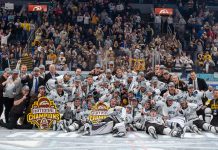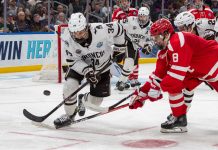BOSTON — There are 17,565 sellable seats for each hockey game at Boston’s TD Garden. The Bruins tend to fill them all, and the NCAA was pleased to put a body on every cushion this weekend as well.
Yet, with a capacity greater than the total undergraduate enrollment at any of the four participating schools, fewer than 400 of those 17,565 tickets — 2.3 percent — ever made their way to actual students.
It’s not always convenient for vehicularly and financially challenged undergrads to support their tournament teams in person; in fact, it’s a bit of a rarity lately for a Frozen Four to include a team from the host state, much less the same city.
That said, this year’s final weekend includes two schools that didn’t even have time for a movie on the bus ride over (Boston University and Providence) and another that always travels well in North Dakota. If ever room ought to be made for greater student attendance, 2015 made a strong case.
While the NCAA ticket allocation has varied between 500 and 800 in the recent past, the association allotted 600 tickets to each participating program this spring to be distributed however the schools felt best. Unsurprisingly, students are generally not at the top of that pecking order: Donors, boosters, board members and trustees; alumni; season-ticket holders; and team staff and player considerations trump the tuition payers.
Once the big fish had their fill, students earned their shot at the remainder. All four programs sold out their 600, so there were never going to be enough to meet the demand; instead, the schools rewarded students for high regular season attendance through loyalty-points programs and/or held lotteries to most fairly distribute what was left of the 600.
In the end, Omaha students took 125 seats. Hometown Boston University students claimed between 75 and 100. North Dakota was left with 61 stubs for students, and Providence — a school with just 3,810 undergraduates — scrounged up just 50 for the student raffle.
The first object of scorn might seem like the NCAA given its paltry allotment, but the per-program package is low for a reason: Since Frozen Four tickets go on sale well before the tournament even begins, the governing body wants to assure as many tickets sold as possible before the field is decided.
After all, even a hockey hotbed like Boston would be unlikely to sell out a Frozen Four featuring, say, Minnesota State, Quinnipiac, Denver, and Minnesota-Duluth, which could well have happened this year. Ergo, the NCAA ticket office opens for business when all 59 teams still have some hope of qualifying and there is ample optimism to go around.
Schools may deserve some of the blame for the situation, but it’s hardly shocking that institutions would want to satisfy the individuals who support them ahead of all others, and there are only so many tickets to which the schools have access in the first place.
If there is any legitimate blame to be levied, it may lie in the NCAA’s ticket-resale system. The NCAA Ticket Exchange allows fans to resell their tickets at any price, not capping the maximum at face value or any other amount.
NCAA associate director of media coordination and statistics Mark Bedics explained that the organization picked the lesser of two evils in establishing its exchange: In order to minimize incidents of ticket fraud, the NCAA verifies and guarantees tickets sold through its exchange while allowing sellers to place any price tag they like. This gives ticket holders every incentive to use their site, even if the markup is extreme: Lower-bowl tickets to Thursday’s games (one ticket got you a seat for both contests) were being sold for upwards of $350, well beyond face value.
In the end, nobody is truly to blame for so few students in the stands Thursday. The NCAA followed a system designed to minimize loss. The schools looked out for their own as fairly as they could, while still considering their long-term relationships, and the NCAA Ticket Exchange prioritizes security and reliability over, perhaps, equity.
The NCAA emphasizes the “student” in “student-athlete.” It’s an unfortunate collusion of circumstance that students could not be better emphasized at TD Garden Thursday night.


